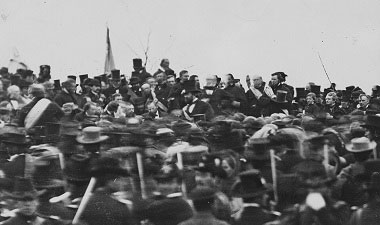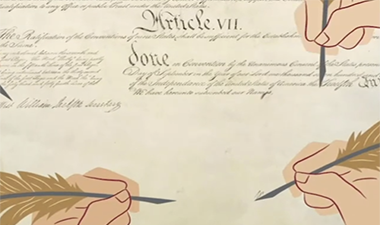To draw attention to the inequalities and oppressive laws facing women in pre-Civil War America, Stanton drafted a “Declaration of Sentiments,” which was later signed by 68 women and 32 men.
Explanation
In July 1848, abolitionists Elizabeth Cady Stanton and Lucretia Mott organized a convention to discuss women’s issues in Seneca Falls, New York. The Seneca Falls Convention attracted nearly 300 people. To draw attention to the inequalities and oppressive laws facing women in pre-Civil War America, Stanton drafted a “Declaration of Sentiments,” which was later signed by 68 women and 32 men. In it, Stanton drew on America’s Founding principles to push for freedom and equality for women. Using the Declaration of Independence as a model, Stanton rooted her argument in these powerful words: “We hold these truths to be self-evident; that all men and women are created equal.” From there, instead of listing a set of grievances against the British king, Stanton included a list of complaints against men. Finally, she concluded with a list of demands, including the right to vote for women.
Excerpt
When, in the course of human events, it becomes necessary for one portion of the family of man to assume among the people of the earth a position different from that which they have hitherto occupied, but one to which the laws of nature and of nature’s God entitle them, a decent respect to the opinions of mankind requires that they should declare the causes that impel them to such a course.
We hold these truths to be self-evident; that all men and women are created equal; that they are endowed by their Creator with certain inalienable rights; that among these are life, liberty, and the pursuit of happiness; that to secure these rights governments are instituted, deriving their just powers from the consent of the governed. Whenever any form of government becomes destructive of these ends, it is the right of those who suffer from it to refuse allegiance to it, and to insist upon the institution of a new government, laying its foundation on such principles, and organizing its powers in such form, as to them shall seem most likely to effect their safety and happiness. Prudence, indeed, will dictate that governments long established should not be changed for light and transient causes; and, accordingly, all experience hath shown that mankind are more disposed to suffer, while evils are sufferable, than to right themselves by abolishing the forms to which they are accustomed. But when a long train of abuses and usurpations, pursuing invariably the same object, evinces a design to reduce them under absolute despotism, it is their duty to throw off such government, and to provide new guards for their future security. Such has been the patient sufferance of the women under this government, and such is now the necessity which constrains them to demand the equal station to which they are entitled.
The history of mankind is a history of repeated injuries and usurpations on the part of man toward woman, having in direct object the establishment of an absolute tyranny over her. To prove this, let facts be submitted to a candid world.
. . .
He has withheld from her rights which are given to the most ignorant and degraded men—both natives and foreigners.
Having deprived her of this first right of a citizen, the elective franchise, thereby leaving her without representation in the halls of legislation, he has oppressed her on all sides.
He has made her, if married, in the eye of the law, civilly dead.
He has taken from her all right in property, even to the wages she earns.
. . .
He has monopolized nearly all the profitable employments, and from those she is permitted to follow, she receives but a scanty remuneration.
He closes against her all the avenues to wealth and distinction which he considers most honorable to himself.
. . .
He has usurped the prerogative of Jehovah himself, claiming it as his right to assign for her a sphere of action, when that belongs to her conscience and her God.
He has endeavored, in every way that he could to destroy her confidence in her own powers, to lessen her self-respect, and to make her willing to lead a dependent and abject life.
. . .
Now, in view of this entire disfranchisement of one-half the people of this country, their social and religious degradation,—in view of the unjust laws above mentioned, and because women do feel themselves aggrieved, oppressed, and fraudulently deprived of their most sacred rights, we insist that they have immediate admission to all the rights and privileges which belong to them as citizens of these United States.
2. Resolutions
Resolved,
That woman is man's equal--was intended to be so by the Creator, and the highest good of the race demands that she should be recognized as such.
Resolved,
That the women of this country ought to be enlightened in regard to the laws under which they live, that they may no longer publish their degradation, by declaring themselves satisfied with their present position, nor their ignorance, by asserting that they have all the rights they want.
. . .
Resolved, therefore.
That, being invested by the creator with the same capabilities, and the same consciousness of responsibility for their exercise, it is demonstrably the right and duty of woman, equally with man, to promote every righteous cause by every righteous means; and especially in regard to the great subjects of morals and religion, it is self-evidently her right to participate with her brother in teaching them, both in private and in public, by writing and by speaking, by any instrumentalities proper to be used, and in any assemblies proper to be held; and this being a self evident truth, growing out of the divinely implanted principles of human nature, any custom or authority adverse to it, whether modern or wearing the hoary sanction, is to be regarded as self-evident falsehood, and at war with the interests of mankind.







